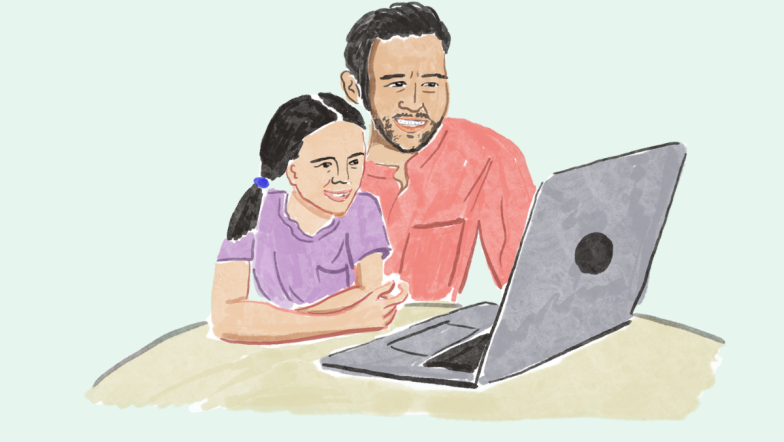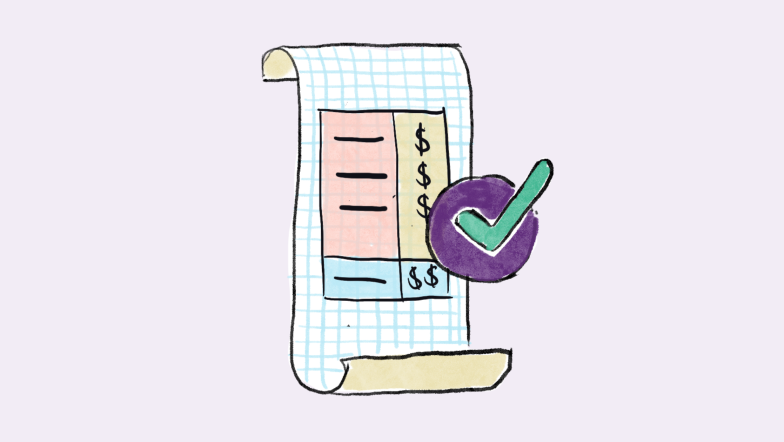Insights from our July COVID-19 response: redesigning Dear Landlord to help Victorian renters affected by COVID-19
10 Sep 2020
Since the outbreak of COVID-19, we’ve been taking a human-centred approach in our response to the pandemic. We’ve been measuring the impact of our work and using data to make evidence-based decisions and improvements. That means that our response has been evaluative and iterative. We’re taking what we learn from our work and using that information to provide a better response in the future.
On a practical level, we’re leveraging pro bono wherever possible and using technology to increase the reach and scale of our work. We’re also advocating for system-level changes, which is why we’ve been sharing our findings to help our sector peers (as well as policy and decision makers) learn from our insights.
In this update, alongside our top-level insights from our July COVID-19 response, we discuss how we redesigned our Dear Landlord tool to help renters affected by COVID-19 and share our key learnings from the first two-weeks of re-launching the tool.
Our data on demand for legal help in July
We had 42,500 users in July, which was a monthly record for our website. Our previous record was 31,000 users in April and we expect to break that record again before the year is out. At a glance, we received 65,000 unique page views, including 38,000 to our self-help resources. That was a 125% increase in people accessing our self-help resources compared to June.
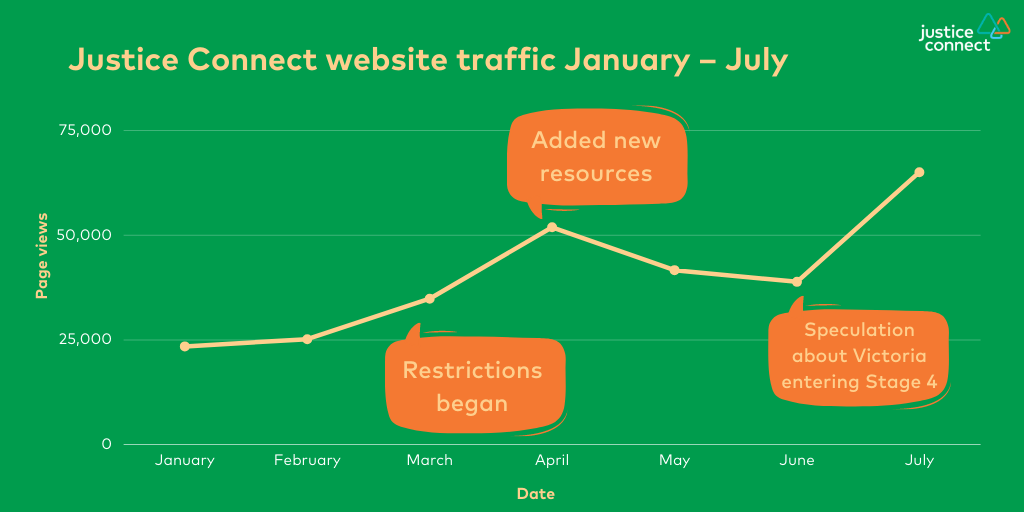
July’s additional traffic was largely directed toward our resource on Emergency Powers in Victoria, which was widely shared through private and public Facebook groups as speculation about Victoria entering a stage of harder lockdown became more widespread.
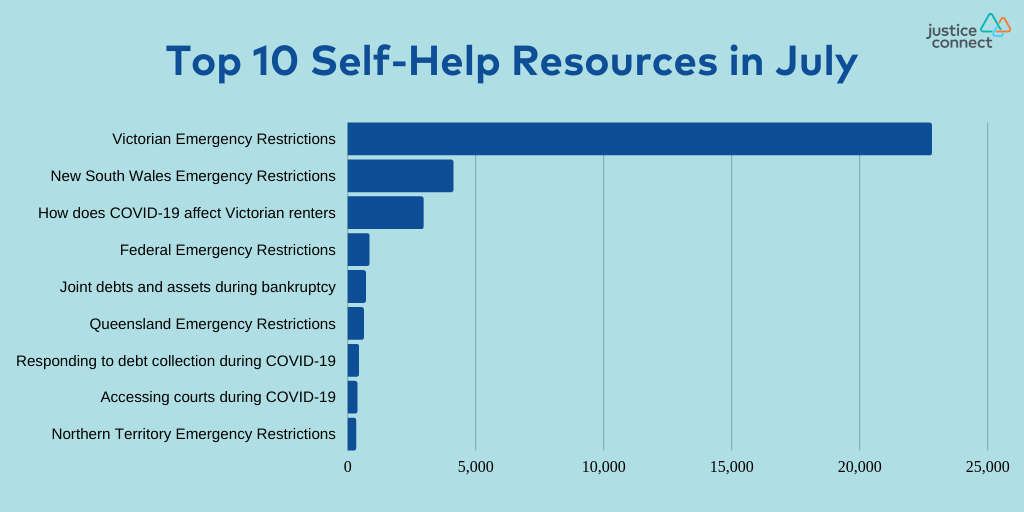
Alongside our resources about emergency restrictions, our resources on what COVID-19 means for Victorian renters and managing debts during COVID-19 also remained popular. We also had 39 questions to our Justice Connect Answers platform. Justice Connect Answers is an online service that allows people to ask simple legal questions and have a lawyer provide discrete advice for free. Of the questions asked in July, the most common questions were related to tenancy (18%) or employment (also 18%).
Financial problems due to COVID-19 have increased housing insecurity
Before the outbreak of COVID-19, people were already finding it hard to afford safe, secure and permanent housing. In Victoria, over 82,000 people are on the waiting list for public and community housing. The COVID-19 pandemic has added more pressure to this existing affordable housing crisis.
According to data from a recent report from ANU, the number of Australians who couldn’t pay their rent or mortgage on time has more than doubled due to COVID-19. At Justice Connect, we’re seeing this reflected through new cohorts of people seeking help for tenancy-related matters.
Our existing cohort of clients have often been homeless or on the brink of homelessness. They have regularly experienced financial and housing insecurity over periods of time, or in some cases for most of their life, particularly due to the growing issues around lack of affordable housing in Australia. As a result of COVID-19, our Homeless Law service is seeing a new cohort of people at risk of homelessness, identifying as ‘recently unemployed’ or ‘on a reduced income’, who have not been at risk of homelessness before.
People who haven’t experienced financial or housing insecurity often have less experience seeking help, so might struggle to find appropriate support services. Additionally, many people see tenancy or housing issues as financial problems not legal problems. We know from experience running our Homeless Law service that employment and financial problems can be the early warning signs that lead to entrenched disadvantage and poverty.
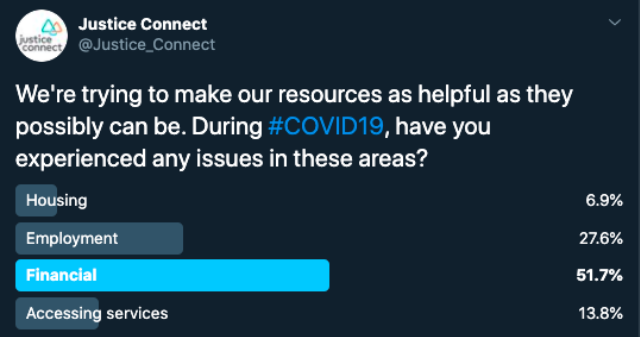
Our research (as well as data collected on traffic to our self-help resources) indicates that financial problems are prominent due to the COVID-19 pandemic. We aim to prevent these legal problems from escalating because we know that many of these problems will have flow-on effects for housing security. A key component of our strategy is to intervene earlier to help people manage their financial problems before they escalate into more serious legal issues.
At the initial outbreak of the pandemic, our Dear Landlord self-help tool saw a huge increase in traffic. However, while our tool could provide help to some Victorian renters, it wasn’t designed with the unique problems caused by COVID-19 in mind.
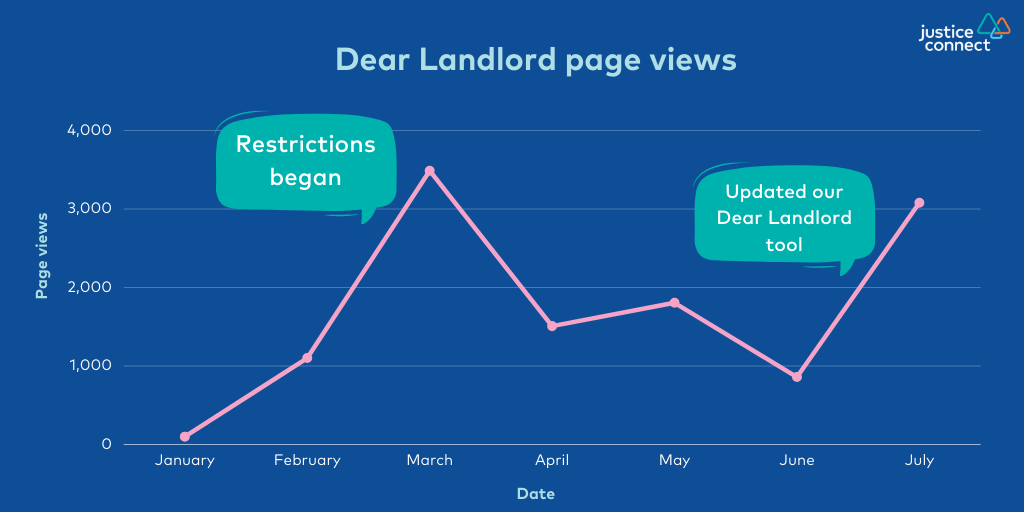
We re-designed Dear Landlord to help renters navigate new COVID-19 laws
Our original Dear Landlord self-help tool was designed to support people who had fallen behind in rent to avoid eviction for rental arrears, while also directing people who required more intensive support to our Homeless Law service.
Under the new Victorian COVID-19 tenancy laws, landlords can no longer issue a notice to vacate for rental arrears. Instead, the new laws provide a rent reduction process if tenants can’t afford to pay their rent due to COVID-19.
With many renters struggling to navigate these new tenancy laws, we recognised the importance of Dear Landlord in empowering people on their rights and how to get legal and non-legal help to tackle their tenancy problems. We decided to update Dear Landlord to respond to the unique challenges that renters are facing during the pandemic and focus on preventative measures that ensure people stay in their homes.
The second iteration of Dear Landlord asks a series of questions and then, based on the answers:
- Generates tailored letters from renters to their landlords to negotiate a rent reduction
- Generates tailored rent reduction agreements to lodge with Consumer Affairs Victoria (CAV)
- Gives renters information about how to seek mediation and conciliation if their landlord won’t negotiate or consider a rent reduction
- Provides renters with information on the process of changing or ending rent reduction agreements or Dispute Resolution Orders
- Provides information for renters to navigate VCAT proceedings, including generating VCAT review applications for renters who have missed VCAT hearings
- Provides renters with information on ending leases
- Provides referrals to renters for specialised legal and financial help.
The redevelopment of Dear Landlord followed our strategic service design and delivery principles and was based on direct insights from people with lived experience of housing insecurity, homelessness and financial instability. The outcomes in Dear Landlord are based on the wide array of legal options available to tenants with rent-related issues under the new COVID-19 tenancy laws.
Our insights from the first two-weeks of re-launching Dear Landlord
In those first two weeks after the launch of Dear Landlord, the highest outcomes for people using Dear Landlord was negotiating a rent reduction with their landlord (30% of people) and ending a lease agreement (9% of people).
The main reasons for negotiating a rental reduction were due to reduced employment (65% of people) or having lost work entirely (35% of people).
Along with being impacted by reduced or lost employment, 15% of people who used the tool commented that they were struggling to find new housemates after previous tenants had moved out due to COVID-19. Another 10% of people who used the tool were impacted due to caring for family members.
Already, we’re seeing clear connections between employment related matters and financial and tenancy issues. We expect to have a better picture of how people are using our tool and their circumstances once we have a few more months of data.
How we’ve promoted Dear Landlord
Recognising that for many people, this was the first time they had experienced housing insecurity or financial issues, our strategic communications plan was designed to ensure that we were reaching people who weren’t already familiar with our services. We began to share Dear Landlord and our self-help resources in closed Facebook communities, which we identified as a key channel people were using to source information and support during the pandemic. We also contacted key cultural and religious groups to ensure that we were connecting with a cross-section of the community.
We promoted Dear Landlord with a mix of paid and organic advertisements across Facebook, Twitter, Instagram and Google Ads. In the month of July, 79% of people who found us through our targeted Google Ads had never been to Justice Connect’s website before. People were finding Dear Landlord by using search terms such as:
- renters rights victoria
- tenancy law victoria
- rent relief package victoria
- rental legal advice
- cannot pay rent
- what can landlord do if you don’t pay rent
- where do I complain about my landlord
- letter to landlord not paying rent
- tenancy disputes
We continued to split-test ad images on Facebook to understand what resonated best with different demographics. We found that for older demographics, photographic images performed better than single illustrations, while younger demographics who were socially engaged preferred illustrations. We also tested shorter captions against longer captions, and found that shorter was preferred, despite providing less detail about the app.
Organic search term analysis revealed that, despite the extension of an eviction moratorium, eviction was still a key concern for renters using Dear Landlord. People found us through search terms such a ‘can I be evicted victoria’, ‘fighting an eviction notice victoria’ and ‘can your landlord kick you out’.
We’re using our service delivery insights to engage in targeted advocacy
Justice Connect has drawn on our casework evidence, user data and client insights to inform our advocacy with government on housing insecurity during COVID-19. This has included working closely with the legal assistance, homelessness and community-service sectors to ensure that Victoria introduced some of the strongest residential tenancies and financial protections in Australia, which better guarantee that renters are not evicted during COVID-19. Our ongoing collaborative advocacy during COVID-19 has also resulted in the recent government announcement of a proposed extension to the residential tenancies protections until 28 March 2021.
As part of the Victorian Housing Peaks alliance and as a member of the Everybody’s Home campaign, Justice Connect has also been calling for more social housing with wrap-around supports to help end homelessness in response to COVID-19 and beyond. We have already seen welcome responses, including the Victorian government’s announcement of a $500 million investment in social housing.
Given the ever-evolving nature of COVID and the impact on people’s legal and life issues, we want to take a human-centred approach and ensure that our insights from clients and users continuously inform our service design and advocacy work. We are committed to taking what we learn from our work and using that information to create better service and systems responses during COVID and beyond.
We’ll continue to provide updates on our insights from Dear Landlord over the coming months. As more people use our tool, we’ll use our learnings to identify trends in legal need and respond to them accordingly.
Subscribe to our mailing list to receive the latest insights from our COVID-19 response.
